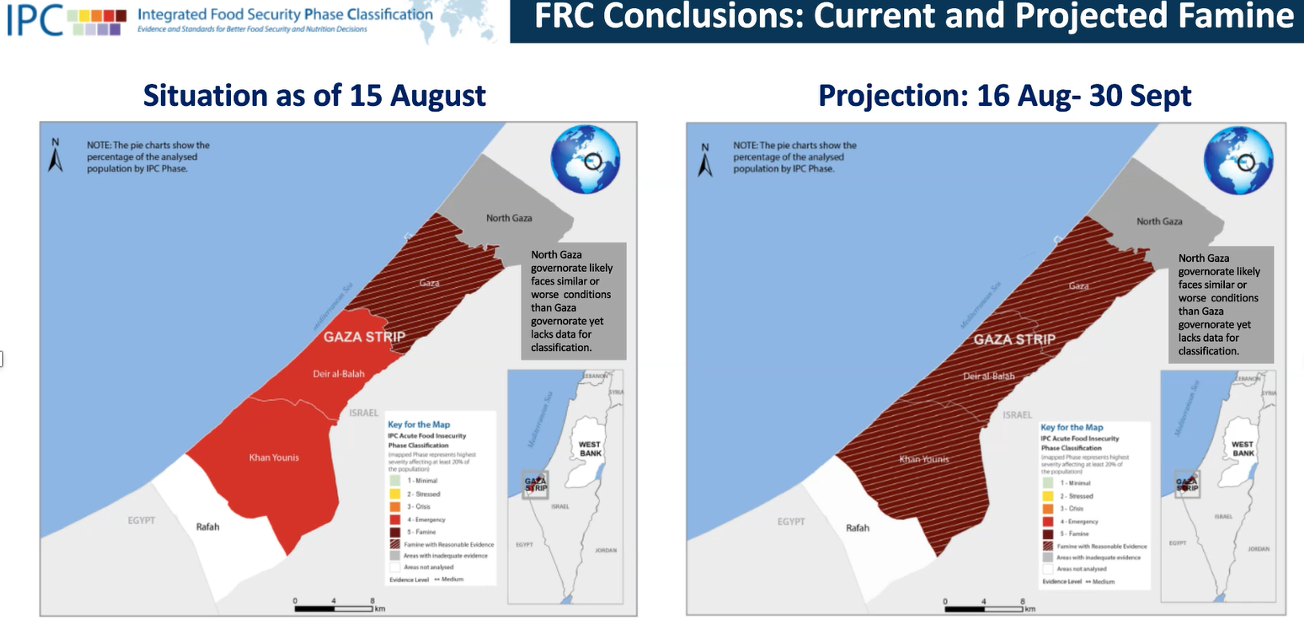
- State of Palestine
- Food Crisis and Related Risk Factors
- IPC Alerts
- Acute Food Insecurity
- Nutrition
- Conflict
Related blog posts
The chance to prevent widespread famine in the Gaza Strip has passed, according to the IPC Famine Review Committee (FRC). The prolonged food crisis in Gaza reached an unprecedented and devastating level in July and August, with the FRC confirming famine in Gaza Governate and projecting famine thresholds to be crossed in Deir al-Balah and Khan Younis Governates in the coming weeks. This latest update places more than half a million people at risk of starvation.
Across all governates, between 28 and 34 percent of households reported experiencing very severe hunger between July 1 and July 30. IPC estimates that by June 2026, more than 132,000 children under five will be suffering from acute malnutrition, with more than 41,000 at heightened risk of death.
The latest IPC analysis, concluded on August 4, marked the fifth such review of the food security and nutrition situation in Gaza since the outbreak of conflict in October 2023. This is the first time in FRC history that the Committee has needed to analyze a crisis this many times.
Failures in Food Assistance Continue
As reported in previous analyses, the territory’s infrastructure has been virtually destroyed, domestic agricultural land has been decimated, and wide swathes of the population have experienced repeated displacement. The result has been a population almost entirely dependent on humanitarian aid for food, water, and health and medical supplies.
Such aid has been continually disrupted by blockades and strict limits on delivery volumes. Aid convoys continue to face significant danger even when they are allowed to cross the borders, with nearly 2,000 civilian deaths since March occurring during attempts to access food aid or humanitarian services. FRC estimates that one out of every five to six deaths since the end of the short-lived ceasefire in March is directly linked to food insecurity.
While food aid deliveries in August may meet the minimum required volume of 62,000 metric tonnes, the FRC emphasizes that this would still not be sufficient to reverse the region’s catastrophic food insecurity.
Disrupted Services Will Put Further Lives at Risk
Feeding programs for children and other vulnerable populations have experienced declining supplies in the past months, with some programs even closing their doors entirely. The FRC reports the number of children under the age of five who have received supplementary feeding has declined significantly since June. Acute malnutrition, particularly among children, will only continue to rise as programs and malnutrition treatment services are forced to close in the coming weeks.
Nearly 96 percent of the region’s households reported facing moderate to severe water insecurity as well, with two-thirds of households facing serious concerns about having enough potable water. Access to sanitation systems and supplies has also declined dramatically across the region, posing serious threats to the population’s health and hygiene. Combined with increasingly crowded and inadequate shelter, these conditions are rife for the spread of water-borne and air-borne pathogens.
The region’s health system has also been decimated by the conflict. Only 18 of the region’s 36 hospitals were partially operable in mid-August, and medical supplies and medications are dangerously low. Medical professionals themselves are also suffering the effects of rising hunger and malnutrition. They also often remain targets of violence and intimidation, further eroding access to desperately needed healthcare.
Immediate Ceasefire Is Needed; Further Delay Will Only Bring More Death
The FRC report puts its recommendations in stark language. The ongoing humanitarian crisis in the Gaza Strip is man-made, and only man-made action can stop it.
Sustained, large-scale humanitarian response is the only way to prevent even more needless suffering and death in the region. Such a response must take into account not just food, but health and hygiene services, nutrition services, water and sanitation systems, access to fuel and cooking gas, and adequate shelter.
And the only way to ensure the success of such a response, and the reversal of famine conditions, is a complete and immediate ceasefire. While the region faces a long and daunting road to rebuild and establish lasting security, a ceasefire is the necessary first step. No further delay is acceptable in the face of such widespread and preventable loss of life.
Sara Gustafson is a freelance writer and communications consultant.
